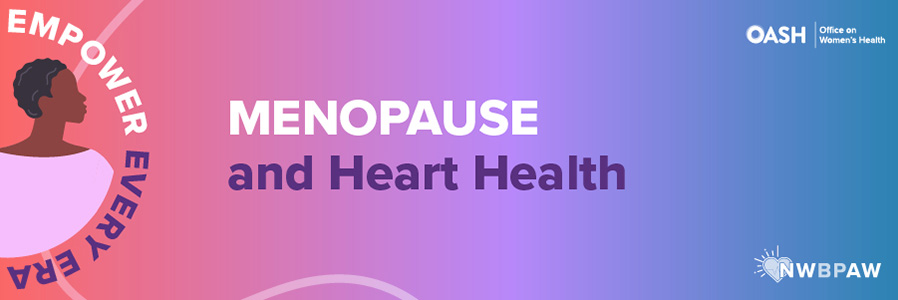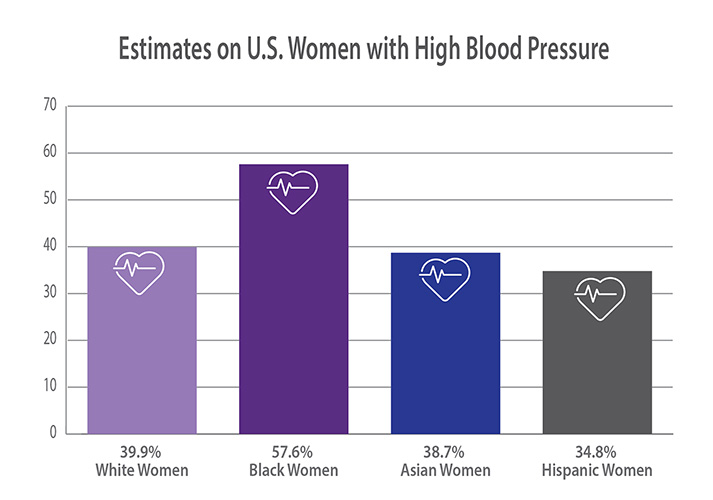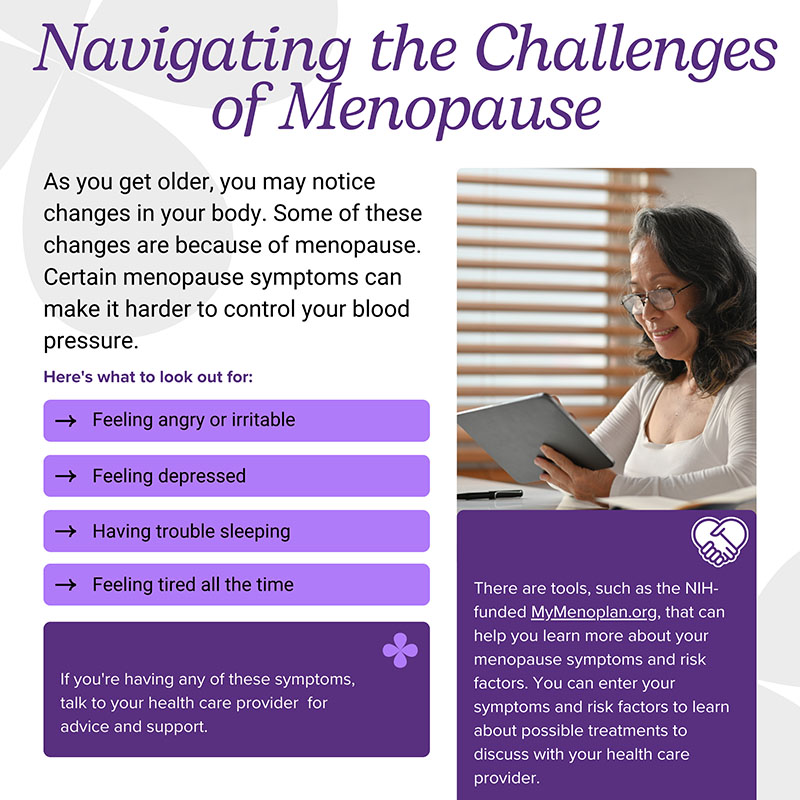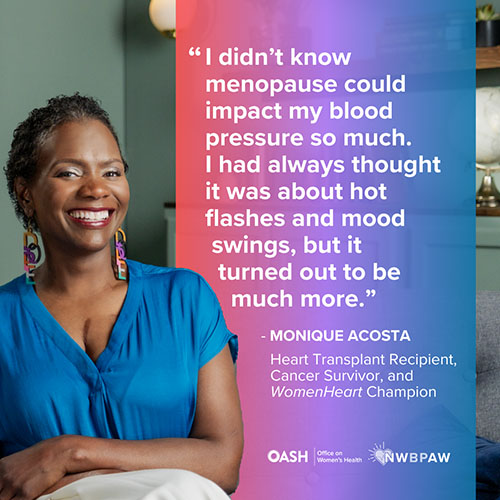Menopause and Heart Health

 Healthy blood pressure is important at every age. For women, blood pressure becomes even more important as they approach menopause and during the years that follow as their risk of high blood pressure goes up. Some research suggests that higher levels of the hormone estrogen during the reproductive years, especially estradiol (a form of estrogen), help keep the heart healthy. As estrogen levels drop with age, women are more likely to have heart problems. Gaining weight and being less active can also increase the risk of high blood pressure during menopause.
Healthy blood pressure is important at every age. For women, blood pressure becomes even more important as they approach menopause and during the years that follow as their risk of high blood pressure goes up. Some research suggests that higher levels of the hormone estrogen during the reproductive years, especially estradiol (a form of estrogen), help keep the heart healthy. As estrogen levels drop with age, women are more likely to have heart problems. Gaining weight and being less active can also increase the risk of high blood pressure during menopause.
After menopause, a majority of women are diagnosed with high blood pressure. High blood pressure affects 75% of women aged 60 or older. Blood pressure can greatly influence heart health, and high blood pressure can be a warning sign of other health problems. Keeping track of your blood pressure, noticing any changes, and talking to your health care provider are important steps you can take to protect your heart health.
Stages of Menopause
People often talk about menopause as one stage in life. However, menopause generally occurs in three phases:
- Perimenopause: The time leading up to menopause and can start several years before your last period. During perimenopause, your hormone levels change, causing symptoms such as hot flashes and irregular periods. This can begin as early as age 40. Nearly 50% of women ages 40-59 have high blood pressure.
- Menopause: Happens when you permanently stop getting periods after the ovaries stop producing hormones, and you can’t get pregnant naturally anymore. You are in menopause if you haven’t had any bleeding, even spotting, for 12 months straight after the ovaries stop producing hormones. In the U.S., most women go through menopause between ages 45 and 55, with the average age being 52. Studies show that about 30% of women experience a significant rise in blood pressure during menopause.
- Postmenopause: The time after menopause and lasts for the rest of your life. You may still have menopausal symptoms during this time. About 75% of women age 60 and older have high blood pressure.
 Share the fact sheet on menopause and blood pressure with your network
Share the fact sheet on menopause and blood pressure with your network
Menopause and Health Risks
During midlife, many women experience the first signs of chronic diseases and chronic conditions, including high blood pressure.
During the transition to menopause, the risk of high blood pressure starts to increase. Weight gain can be one contributor to increased risk as lower estrogen levels may play a role in weight gain after menopause. Weight gain may also be caused by slower metabolism, new food-related choices such as eating more prepared and processed foods, and reduced physical activity. Many women also lose muscle mass as they age, which can slow down their metabolisms.
Additional Risks and Strategies for Controlling High Blood Pressure
Many other factors can also increase a person’s risk for high blood pressure. Some of these factors, such as age, family history, and certain health conditions, cannot be controlled. However, you can take action in many areas to control your blood pressure. Whether you’re approaching menopause, or you’ve already reached it, it’s always a good time to adopt habits that support your overall heart health. Here are some tips to begin or maintain heart healthy habits:
- Choose foods that are lower in salt (sodium) and rich in potassium, such as fruits and vegetables.
- Avoid or limit alcohol.
- Get regular physical activity.
- Aim for a healthy weight.
- Quit smoking and vaping.
- Control your cholesterol and blood sugar levels.
- Manage stress.
- Get enough good-quality sleep.
- See a health care provider for routine checkups and screenings.
If lifestyle changes are not enough to lower your blood pressure, your health care provider can prescribe medication and work with you to develop a treatment plan.
Stories from Women with Lived Experience
Monique, a cancer survivor, began having high blood pressure during menopause. She has lived with heart disease for 20 years, including heart failure, and received a heart transplant, but continues to advocate for her own heart health and encourages other women to do the same. Read more about Monique’s journey.
Resources to Learn More
Learn more about menopause and blood pressure to help you better manage your health and prevent disease.
For Women, Girls, and Families
- Fact Sheet on Menopause and Blood Pressure — HHS Office on Women’s Health (OWH)
- Go Red for Women at Every Season of Life (video) — American Heart Association (AHA)
- High Blood Pressure and Women Fact Sheet — NIH National Heart, Lung, and Blood Institute (NHLBI)
- Menopause — HHS Office on Women’s Health (OWH)
- Menopause — NIH National Institute on Aging (NIA)
- Managing Menopause — National Institutes of Health (NIH)
- Menopause and Women’s Health — American Heart Association (AHA)
- Menopause Map — Endocrine Society
- The Truth About Women and Heart Disease — NIH National Heart, Lung, and Blood Institute (NHLBI)
For Health Care Providers
- Menopause & Midlife Health — NIH Office of Research on Women’s Health (ORWH)
- Researchers review findings and clinical messages from the Women’s Health Initiative 30 years after launch — NIH National Heart, Lung, and Blood Institute (NHLBI)
- Menopause — American College of Obstetricians and Gynecologists (ACOG)
- Menopause — The North American Menopause Society



 View larger image
View larger image View larger image
View larger image View larger image
View larger image View larger image
View larger image